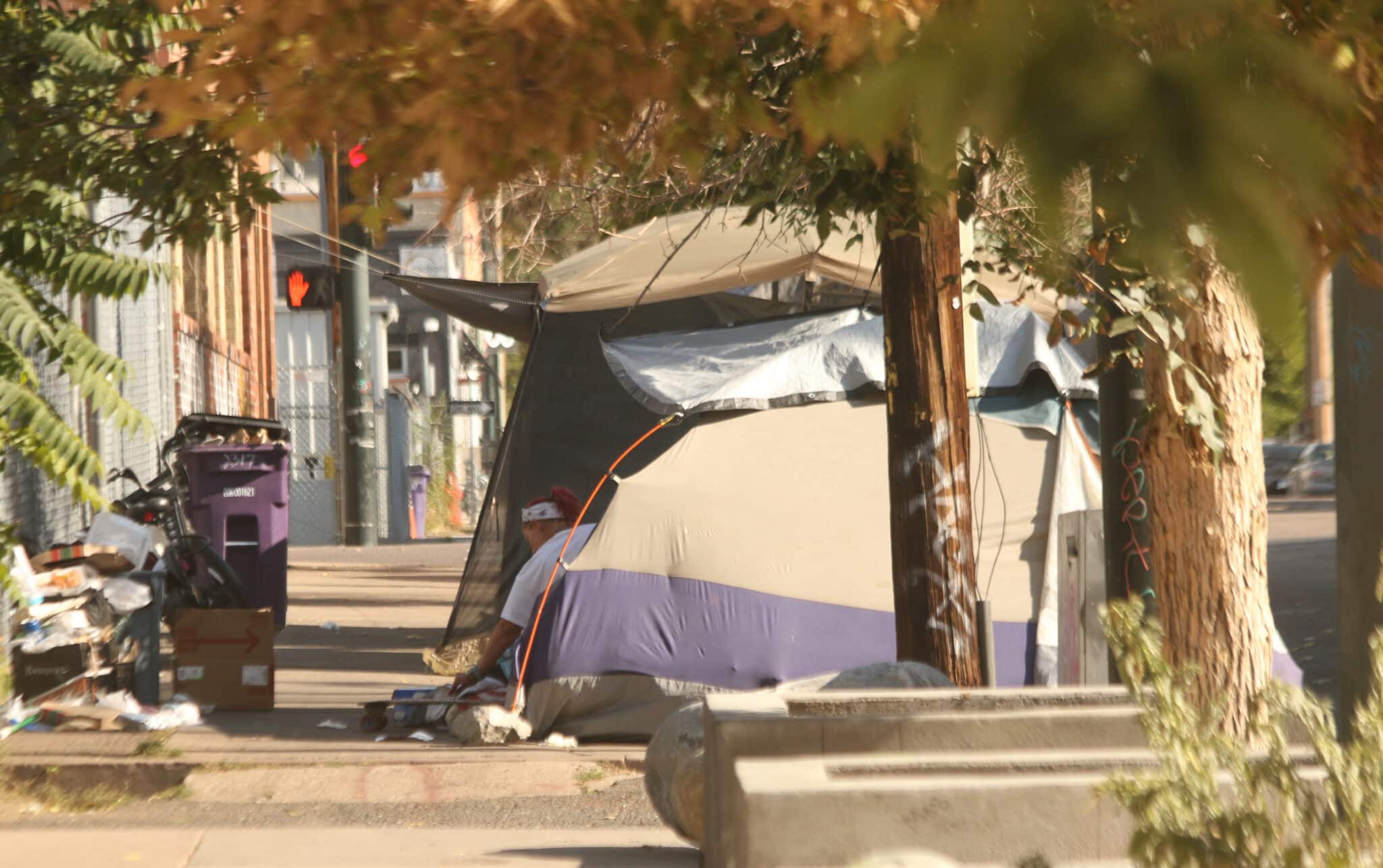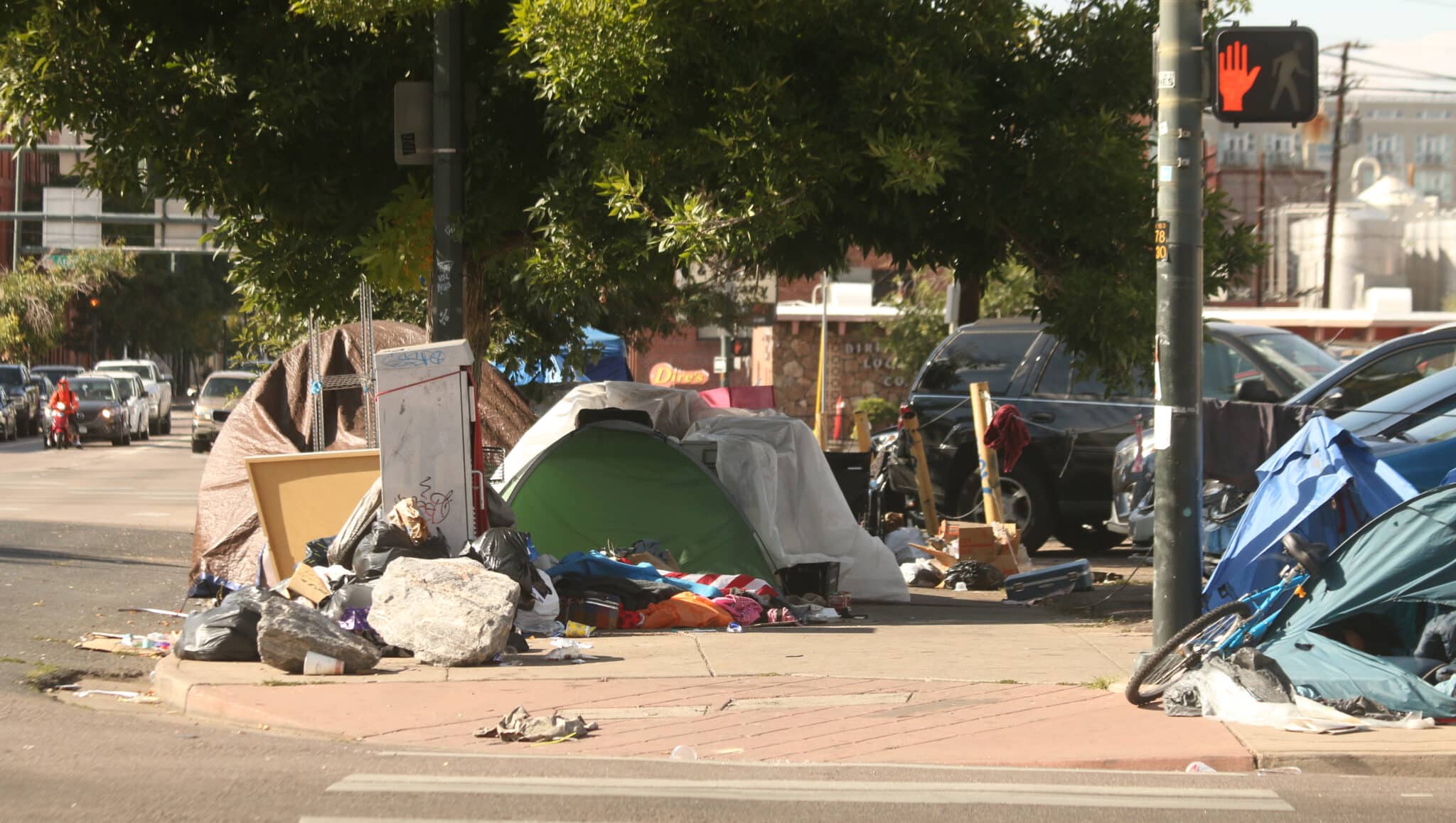
A woman leans outside a tent Monday situated in an area of Arapahoe Square that would be part of the city’s proposed cleanups of homeless encampments. (Eric Heinz photos)
Denver is looking to make a section of Arapahoe Square a regular stop on its series of homeless encampment cleanups.
According to notices posted last week by the city, the “regular cleanup area” would be a generally triangular zone with the boundaries of Broadway and Park Avenue West, and Welton and 20th streets.
Regular cleanups are defined as those that take place three or more times a week between 8 a.m. and 1 p.m. on weekdays. The cleanups are intended to keep sidewalks and other public rights-of-way clear and to keep the areas as hygienic as possible.
People are required to remove their belongings during the cleanups. But if they don’t, the city is required to post where those items have been taken and how to pick them up. When the cleaning is finished, people may return to the area with their belongings as long as those items don’t block pedestrians.
Denver has an urban camping ban ordinance in place that does not allow people to sleep overnight on public or private property, unless given the authority to do so. More than 80 percent of voters rejected a ballot initiative in 2019 that would have essentially overturned the ordinance.
The city has done cleanups of homeless encampments for years, but the degree of enforcement can vary and many encampments remain in place for lengthy periods of time.
The city is required to post notifications of cleanups at homeless encampments at least a week in advance, but only 48 hours in advance for sites deemed to be a health hazard.
That’s required by a settlement reached between Denver and Raymond Lyall and five other plaintiffs in 2019. Lyall and the other plaintiffs sued the city in federal court in 2016 over the cleanups, also called “sweeps” by homeless advocates, and a federal judge ruled in their favor in 2017.

Encampments within Arapahoe Square prompted the city to propose cleanups at least three times a week.
The settlement stated the city will work with Denver Homeless Out Loud and Colorado Coalition for the Homeless to provide cleanup notifications.
According to the posted notices, a meeting that will address the Arapahoe Square cleanup area will take place with Denver officials and the Lyall Settlement Advisory Group at 9:45 a.m. Wednesday at the La Alma Lincoln Park Amphitheater at 1102-1198 Osage St.
Representatives for Denver Homeless Out Loud, which advocates for homeless people’s rights, said they have seen homeless people have their belongings confiscated at other cleanups conducted by the city.
“It looks like they’re trying to do the same thing,” Benjamin Dunning, a spokesman for Denver Homeless Out Loud, told BusinessDen.
Dunning said Denver Homeless Out Loud is working with attorneys on the matter to determine how to respond to the cleanups. He said the prospect of more development coming to the area has been burdensome on the homeless, and the group is skeptical of how the cleanups will be handled.
“I think the big issue is that (Arapahoe Square) is close to the baseball stadium,” Dunning said. “They’re trying to develop all those parking lots. They have ideas of things they’d like to build there instead, and that’s the pressure that comes on the homeless.”
A ballot initiative spearheaded by the Denver Republican Party on the Nov. 2 ballot asks voters whether Denver should enforce unauthorized camping bans and to allow for private security to prohibit it if the city does not respond.
It would also limit Denver’s maximum sanctioned outdoor camping spaces to four. The city currently has only two in operation, one at Park Hill United Methodist Church and one at Regis University.

A woman leans outside a tent Monday situated in an area of Arapahoe Square that would be part of the city’s proposed cleanups of homeless encampments. (Eric Heinz photos)
Denver is looking to make a section of Arapahoe Square a regular stop on its series of homeless encampment cleanups.
According to notices posted last week by the city, the “regular cleanup area” would be a generally triangular zone with the boundaries of Broadway and Park Avenue West, and Welton and 20th streets.
Regular cleanups are defined as those that take place three or more times a week between 8 a.m. and 1 p.m. on weekdays. The cleanups are intended to keep sidewalks and other public rights-of-way clear and to keep the areas as hygienic as possible.
People are required to remove their belongings during the cleanups. But if they don’t, the city is required to post where those items have been taken and how to pick them up. When the cleaning is finished, people may return to the area with their belongings as long as those items don’t block pedestrians.
Denver has an urban camping ban ordinance in place that does not allow people to sleep overnight on public or private property, unless given the authority to do so. More than 80 percent of voters rejected a ballot initiative in 2019 that would have essentially overturned the ordinance.
The city has done cleanups of homeless encampments for years, but the degree of enforcement can vary and many encampments remain in place for lengthy periods of time.
The city is required to post notifications of cleanups at homeless encampments at least a week in advance, but only 48 hours in advance for sites deemed to be a health hazard.
That’s required by a settlement reached between Denver and Raymond Lyall and five other plaintiffs in 2019. Lyall and the other plaintiffs sued the city in federal court in 2016 over the cleanups, also called “sweeps” by homeless advocates, and a federal judge ruled in their favor in 2017.

Encampments within Arapahoe Square prompted the city to propose cleanups at least three times a week.
The settlement stated the city will work with Denver Homeless Out Loud and Colorado Coalition for the Homeless to provide cleanup notifications.
According to the posted notices, a meeting that will address the Arapahoe Square cleanup area will take place with Denver officials and the Lyall Settlement Advisory Group at 9:45 a.m. Wednesday at the La Alma Lincoln Park Amphitheater at 1102-1198 Osage St.
Representatives for Denver Homeless Out Loud, which advocates for homeless people’s rights, said they have seen homeless people have their belongings confiscated at other cleanups conducted by the city.
“It looks like they’re trying to do the same thing,” Benjamin Dunning, a spokesman for Denver Homeless Out Loud, told BusinessDen.
Dunning said Denver Homeless Out Loud is working with attorneys on the matter to determine how to respond to the cleanups. He said the prospect of more development coming to the area has been burdensome on the homeless, and the group is skeptical of how the cleanups will be handled.
“I think the big issue is that (Arapahoe Square) is close to the baseball stadium,” Dunning said. “They’re trying to develop all those parking lots. They have ideas of things they’d like to build there instead, and that’s the pressure that comes on the homeless.”
A ballot initiative spearheaded by the Denver Republican Party on the Nov. 2 ballot asks voters whether Denver should enforce unauthorized camping bans and to allow for private security to prohibit it if the city does not respond.
It would also limit Denver’s maximum sanctioned outdoor camping spaces to four. The city currently has only two in operation, one at Park Hill United Methodist Church and one at Regis University.
